Or – “How Can You TELL When A Man Who Swings Through New York In A Leotard Is Crazy, Anyway?”
Anniversary Week continues here at the Stately Spoilers Manor! My name’s Matthew, spinning the hits and reminding you of the things you already knew, but forgot were awesome the first time! Those who pay close attention to Major Spoilers events like to taunt us that we have a bias towards a certain comic book publisher with a two-letter name. I could spend time refuting that belief, but as with most semantic arguments, it’s probably easier to just move on.
My own comic-reading career started firmly in the Marvel Universe with G.I. Joe, Indiana Jones, and the Shogun Warriors, but the second ever subscription form I ever filled out was for a little book called ‘Amazing Spider-Man.’ I was familiar with the character from the TV series where that kid from the Sound of Music got hung from barely-invisible ropes a lot, but the comics were a whole new ballgame. When I eventually immersed myself in the Peter Parker Experience, I found a couple of stories that really changed my thought-process, not just about the Ol’ Webhead but about comics in general. This the one that has stuck with me the most.
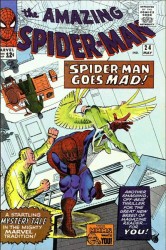 Amazing Spider-Man #24
Amazing Spider-Man #24
Script: Stan Lee
Pencils: Steve Ditko
Inks: Steve Ditko
Letters: Sam Rosen
Publisher: Marvel Comics
Previously, on Amazing Spider-Man: ‘With great power, comes great responsibility.” The words of Benjamin Parker are known to pretty much everyone who ever read a comic book or watched the Electric Company… Peter Parker knows them well, and his guilt over his uncle’s accidental death drive him to put on his red and blue costume whenever evil is afoot as the ever amazing Spider-Man! Born in tragedy, and nurtured by the endless indignities of high school, Spidey’s life gets more and more complicated with each issue. His rapidly growing rogue’s gallery of grown men in funny tights who like to beat up on high school kids combined with his clinically insane boss combined with money troubles combined with his infirm aunt have left Pete in an emotionally fragile state, and nothing he does seems to make things much better. What’s a swinging wall-crawler to do? Collapse like the pig’s glass house when the rocket bird attacks, of course.
The splash page of this issue immediately grabbed me when I first read it (admittedly as a reprint in an issue of Marvel Tales circa 1986 or so) with a tormented Spider-Man writing in horror on a psychiatrist’s couch as hallucinations of his foes float around him. It’s Ditko doing what Ditko does best. Of course, Stan The Man Lee is also in attendance, as we see when Peter (once again worried about money) swings across town to the Daily Bugle to get some freelance work and mack on the pretty secretary. There’s an unpleasant surprise waiting for him…
What’s really interesting in these Silver Age Marvel stories is their elegant nature, the compactness of the story-telling. Sure, Jonah Jameson hates Spidey, but this sequence gives him a chance to show that by his suggestions and his insistent questioning of reporter Frederick Foswell, rather than a Weisinger-era-Superman exposition cloud. Ditko’s faces are incredlbly lively and expressive (not to mention pretty dang ugly) throughout the sequence, and JJJ’s brainstorm sets in motion our issue’s plotline. Jameson’s lackeys head to the streets to get as many eye-witness reports of people who hate Spidey as possible, and if someone hesitates, the answer is “Do you want your name in the papers or not?” Heh. Remember when newspapers were relevant? The bad press gets Spider-Man’s spirits down, but also brings an unexpected twist for Jameson…
“Oh, LOOODVIIIIG!” It’s impossible to hear that name without hearing Gilda Radner talking to a powdery-wigged Belushi, if you’re me. Doctor Rinehart, the kindly analyst, is sure that the negative press, combined with the stresses of Spider-Man’s life are about to lead him to a complete mental breakdown. Jonah, of course, just wants to cover the carnage, but Peter Parker reads the story on the front page of the Bugle the next day, and starts to think he’s losing his mind. In order to prove he’s not crazy, Peter puts on his long underwear and swings across the rooftops in search of mental health… like you do. And then, the horns kick in, and his shoes start to squeak, and Spider-Man starts to have all the proportionate powers of a Timothy Leary.
It’s a scary moment for Peter, and as a reader, I admit to getting a chill at the sudden appearance of villain after villain, and Steve Ditko renders it all in fine fashion. (He was the go-to guy for horror at Charlton and pre-hero Marvel for a reason.) A shaken Spider-Man can’t even swing home, instead running across the rooftops all the way back to Queens and the harbor of Aunt May’s ramshackle brownstone that never quite stops smelling like soup, no matter what she’s cooking.
Okay, Spider-Man is NOT well. Reading these panels for the first time, I was truly worried about the emotional health of our hero, and this being the Marvel Universe, I wasn’t really sure that he WASN’T cracking up. After all, Iron Man had a drinking problem, The Avengers featured spousal abuse, and Nightcrawler was sleeping with his sister. They might DO it! (This was at the time I was reading, not the time the story was originally written.) Turning to kindly Doctor Rinehart for help, Spider-Man finds his hallucinations worsening, leading to a moment that actually gave me mild nightmares in high school…
The Doctor helps Spider-Man to a chair, as spectres of his old foes begin appearing and Parker’s head spins like Nick Danger’s right before Nancy clocked him. While this is going on, though, Jonah Jameson gets bad news from Foswell: Turns out that Rinehart doesn’t have a medical license! He rushes across town, and gets accosted by Flash Thompson for his Spidey-bashing, on his way to Rinehart’s office. I really miss these little moments, where the characters actually seemed to have lives and minds of their own instead of only appearing when it forwards Peter’s story. The supporting cast is half the reason to read early Spidey. Jameson busts in and starts yelling bloody murder just as Rinehart is about to persuade Spider-Man to remove his mask. Flash Thompson follows, and chaos ensues…
Oh, no! Not LOODVIIIG! He seemed so nice to me! “Rinehart’s” plan is actually pretty subtle upon first reading, as he seems to be only a tool of the nefarious Jonah Jameson, and might even have Spidey’s best interests at heart. I imagine that in the 60’s, the thought of a hero losing his sanity was pretty unthinkable stuff for a kid’s comic book, and the complexities of psychological introspection here (though still simple) are a far sight deeper than a comparable issue of Superboy or Captain Atom. Lee and Ditko (and Kirby and blah blah blah fishcakes) built the foundation of the most profitable comic book juggernaut brick by brick with quality work like this, and it’s one of my fave-rave Spider-Man tales (and one of the few that *I* like that shares general critical acclaim.) This issue struck me in it’s elegance back in the day, and even now it holds up to scrutiny. Amazing Spider-Man #24 is a true classic comic, earning the full 5 out of 5 stars overall. (What, you thought I’d half-step STEVE F’ING DITKO?)
Faithful Spoilerite Question Of The Day: Why would it even matter what company comics come from if they’re good comics? Is Silver Age Flash or Bronze Age Iron Man less awesome because of the publisher?





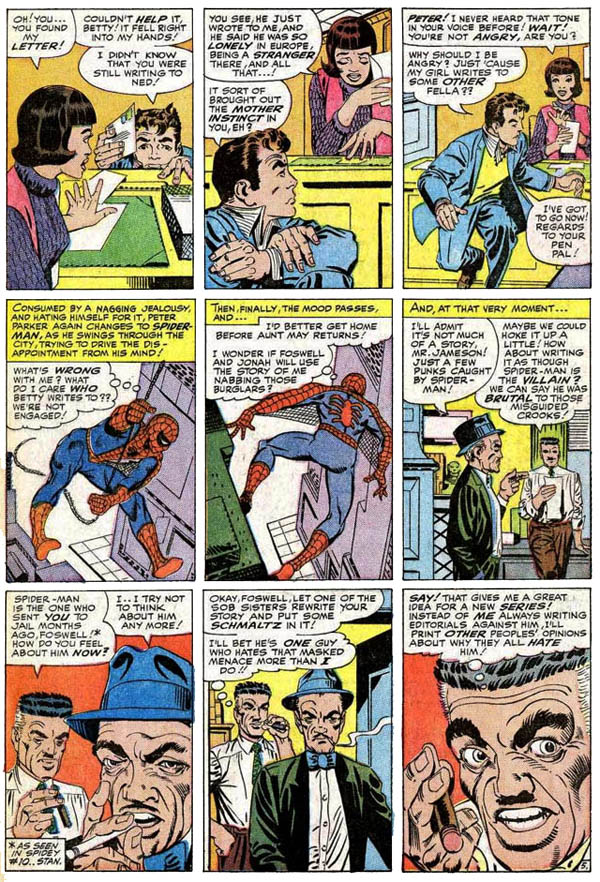
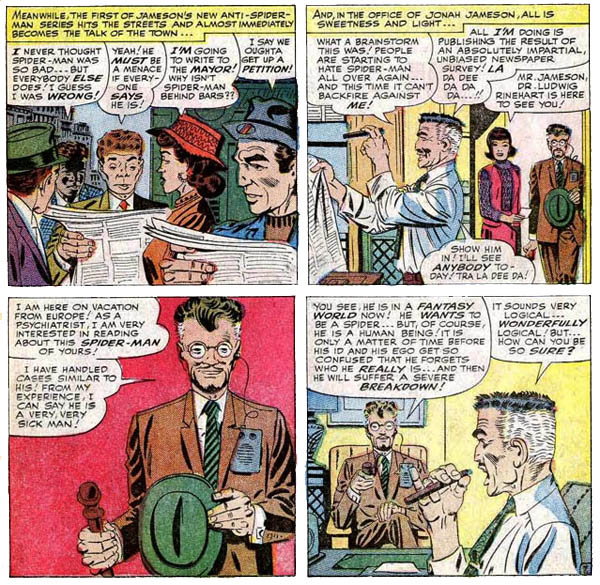
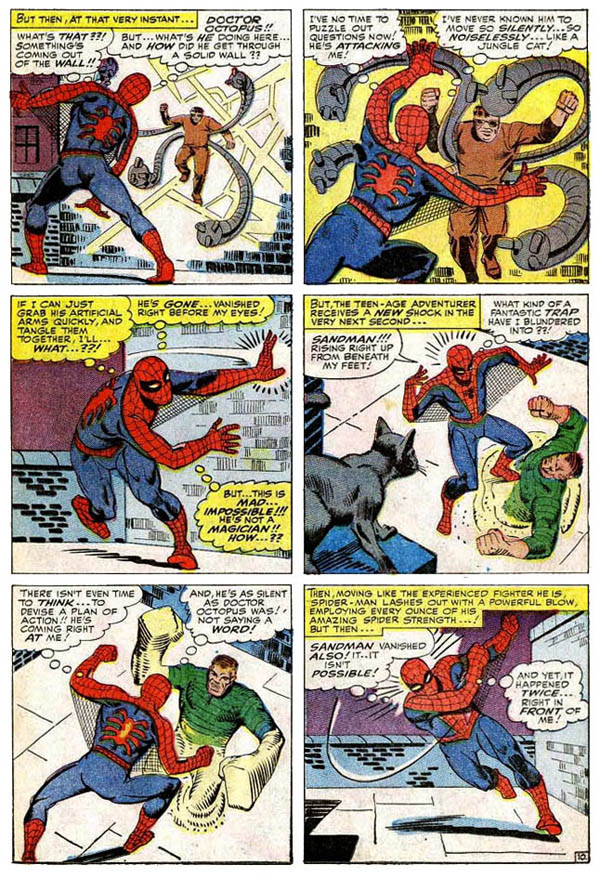
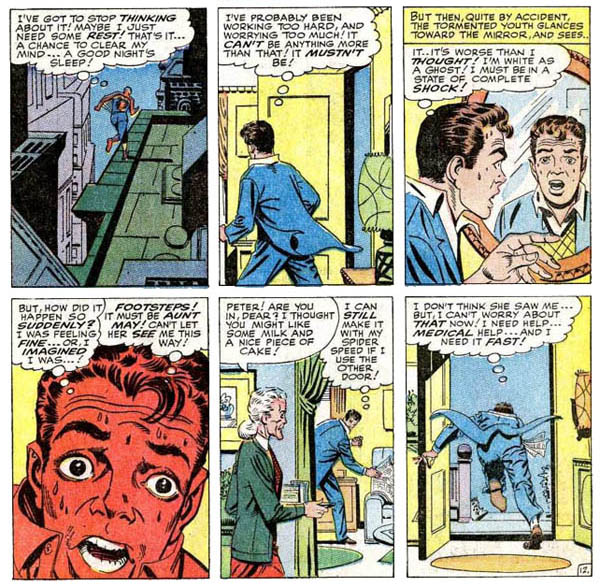

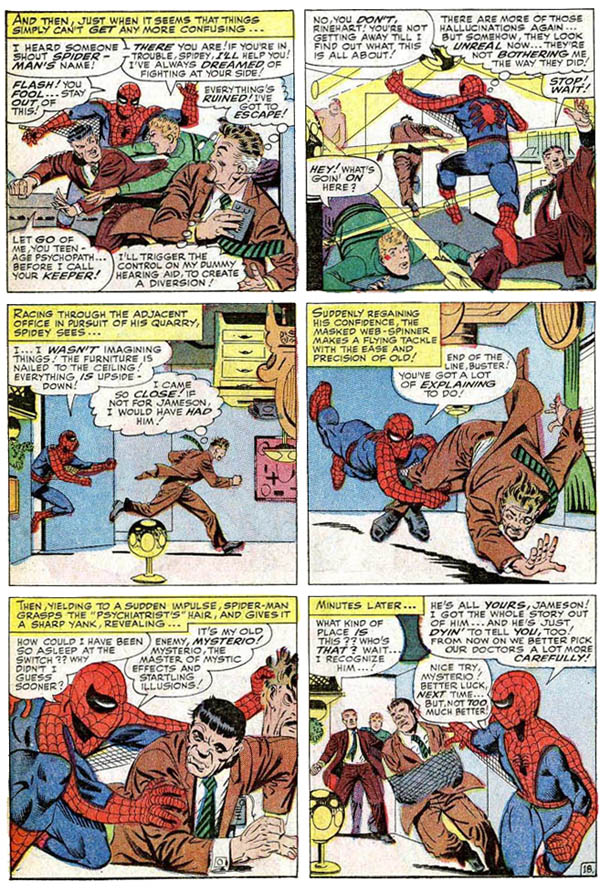
5 Comments
I’ve never been a “loyalist” as far as publishing companies go; I like what I like regardless of the machine behind the magazine. Most of the time my own preferences are for Character(s) first, then storyline and creative talents. Sure, that gets switched around a bit from time to time but I can’t recall a single instance since I first started reading in the VERY early seventies that I chose a book based upon the publisher.
You know what fascinates me?
That there are no metahuman psychologists.
J’onn J’onnz could have a day job. And… some telepath in the marvel U who isn’t one to secretly manipulate everyone.
Xavier, Trauma and J’onn have actually held that gig before. But I see what you mean there’s an advantage if I ever saw one.
It doesn’t matter who the publisher is as long as the story is good. The only way a publisher can kill your enjoyment of something is if it goes out of its way to alienate its fanbase. Like, off the top of my head, making a retcon and having the issue basicly say that whomever liked the former continuity is stupid and wrong.
It doesn’t matter who the publisher is as long as the story is good. The only way a publisher can kill your enjoyment of something is if it goes out of its way to alienate its fanbase. Like, off the top of my head, making a retcon and having the issue basicly say that whomever liked the former continuity is stupid and wrong.
That’s been happening for years with ALL forms of publishing. Remember ‘Who’s Who In The DC Universe?’ For a couple of years they put out monthly issues about the history of everything DC. Batman, in issue #2 got a full pre-Crisis history, including his Earth-2 counterpart.
Superman, whose issue came out AFTER the first issue of Byrne’s “Man Of Steel” did not. The Earth-2 Superman got a write-up about his death, and the new post-Crisis Supes got his due, but the Superman that we’d been reading about for decades didn’t. People were highly pissed, for the very reasons you discuss…
There was a time where writers would go out of their way to hand-wave any story they didn’t like, regardless of the back-and-forth of the continuity damage. I seem to recall that half of Generation X weren’t whom we thought they were, but that versions of the people we thought they were actually existed, even though we’d never seen them (just in case you were a fan of M, Mondo, Emplate or whomever.)
Stupidity knows no publisher-specific limits.